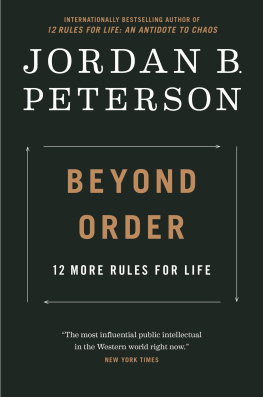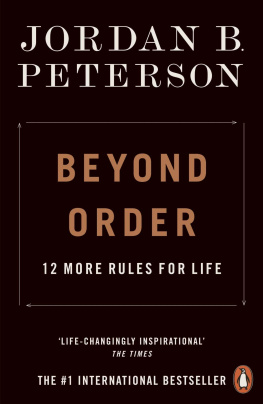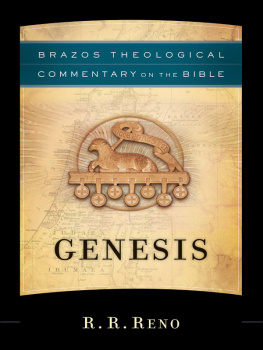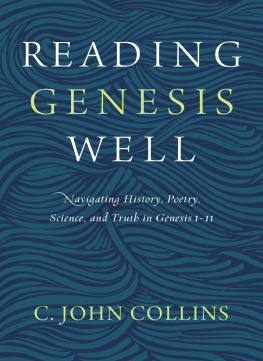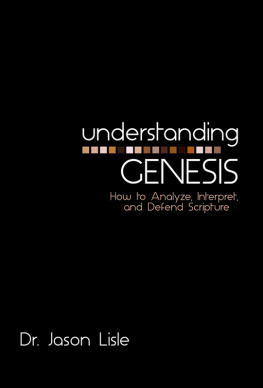Jordan B. Peterson - The Psychological Significance of the Biblical Stories (Genesis)
Here you can read online Jordan B. Peterson - The Psychological Significance of the Biblical Stories (Genesis) full text of the book (entire story) in english for free. Download pdf and epub, get meaning, cover and reviews about this ebook. year: 2017, genre: Religion. Description of the work, (preface) as well as reviews are available. Best literature library LitArk.com created for fans of good reading and offers a wide selection of genres:
Romance novel
Science fiction
Adventure
Detective
Science
History
Home and family
Prose
Art
Politics
Computer
Non-fiction
Religion
Business
Children
Humor
Choose a favorite category and find really read worthwhile books. Enjoy immersion in the world of imagination, feel the emotions of the characters or learn something new for yourself, make an fascinating discovery.
- Book:The Psychological Significance of the Biblical Stories (Genesis)
- Author:
- Genre:
- Year:2017
- Rating:3 / 5
- Favourites:Add to favourites
- Your mark:
- 60
- 1
- 2
- 3
- 4
- 5
The Psychological Significance of the Biblical Stories (Genesis): summary, description and annotation
We offer to read an annotation, description, summary or preface (depends on what the author of the book "The Psychological Significance of the Biblical Stories (Genesis)" wrote himself). If you haven't found the necessary information about the book — write in the comments, we will try to find it.
Jordan B. Peterson: author's other books
Who wrote The Psychological Significance of the Biblical Stories (Genesis)? Find out the surname, the name of the author of the book and a list of all author's works by series.
The Psychological Significance of the Biblical Stories (Genesis) — read online for free the complete book (whole text) full work
Below is the text of the book, divided by pages. System saving the place of the last page read, allows you to conveniently read the book "The Psychological Significance of the Biblical Stories (Genesis)" online for free, without having to search again every time where you left off. Put a bookmark, and you can go to the page where you finished reading at any time.
Font size:
Interval:
Bookmark:
Thursday, May 17, 2018
SendToReader Periodicals
http://sendtoreader.com/user/periodicals
Ill start with this because its the right question: why bother doing this? And I dont mean why should I botherI have my own reasons for doing itbut you might think, why bother with this strange old book at all? Thats a good question. Its a contradictory document thats been cobbled together over thousands of years. Its outlasted many, many kingdoms. Its really interesting that it turns out a book is more durable than stone. Its more durable than a castle. Its more durable than an empire. Its really interesting that something so evanescent can be so long-living. So theres that; thats kind of a mystery.
Im approaching this whole scenario, the Biblical stories, as if theyre a mystery, fundamentally because they are. Theres a lot we dont understand about them. We dont understand how they came about. We don't really understand how they were put together. We dont understand why they had such an unbelievable impact on civilization. We dont understand how people could have believed them. We don't understand what it means that we dont believe them now or even what it would mean if we did believe them. On top of all that, theres the additional problemwhich isnt specific to me but is certainly relevant to methat, no matter how educated you are, youre not educated enough to discuss the psychological significance of the Biblical stories. But Im going to do my best, partly because I want to learn more about them. One of the things I've learned is that one of the best ways to learn about something is to talk about it. When I'm lecturing, Im thinking. Im not trying to tell you what I know for sure to be the case, because theres lots of things that I dont know for sure to be the case. Im trying to make sense out of this, and I have been doing this for a long time.
You may know, you may not, that Im an admirer of Nietzsche . Nietzsche was a devastating critic of dogmatic ChristianityChristianity as it was instantiated in institutions. Although, he is a very paradoxical thinker. One of the things Nietzsche said was that he didnt believe the scientific revolution would have ever got off the ground if it hadnt been for Christianity and, more specifically, for Catholicism. He believed that, over the course of a thousand years, the European mind had to train itself to interpret everything that was known within a single coherent frameworkcoherent if you accept the initial axioms. Nietzsche believed that the Catholicization of the phenomena of life and history produced the kind of mind that was then capable of transcending its dogmatic foundations and concentrating on something else. In this particular case it happened to be the natural world.
Nietzsche believed that Christianity died of its own hand, and that it spent a very long time trying to attune people to the necessity of the truth, absent the corruption and all thatthats always part of any human endeavour. The truth, the spirit of truth, that was developed by Christianity turned on the roots of Christianity. Everyone woke up and said, or thought, something like, how is it that we came to believe any of this? Its like waking up one day and noting that you really dont know why you put a Christmas tree up, but youve been doing it for a long time and thats what people do. There are reasons Christmas trees came about. The ritual lasts long after the reasons have been forgotten.
Nietzsche was a critic of Christianity and also a champion of its disciplinary capacity. The other thing that Nietzsche believed was that it was not possible to be free unless you had been a slave. By that he meant that you dont go from childhood to full-fledged adult individuality; you go from child to a state of discipline, which you might think is akin to self-imposed slavery. That would be the best scenario, where you have to discipline yourself to become something specific before you might be able to reattain the generality you had as a child. He believed that Christianity had played that role for Western civilization. But, in the late 1800s, he announced that God was dead. You often hear of that as something triumphant but for Nietzsche it wasnt. He was too nuanced a thinker to be that simpleminded. Nietzsche understoodand this is something Im going to try to make clearthat theres a very large amount that we dont know about the structure of experience, that we dont know about reality, and we have our articulated representations of the world. Outside of that there are things we know absolutely nothing about. Theres a buffer between them, and those are things we sort of know something about. But we dont know them in an articulated way.
Here's an example: Youre arguing with someone close to you, and theyre in a bad mood. Theyre being touchy and unreasonable. You keep the conversation up and maybe all of a sudden theyd get angry, or maybe they cry. When they cry, they figure out what theyre angry about. It has nothing to do with you, even though you might have been what precipitated the argument. Thats an interesting phenomena, as far as Im concerned, because it means that people can know things at one level without being able to speak what they know at another. In some sense, the thoughts rise up from the body. They do that in moods; they do that in images, and they do that in actions. We have all sorts of ways that we understand before we understand in a fully articulated manner.
We have this articulated space that we can all discuss. Outside of that we have something thats more akin to a dream that were embedded in. Its an emotional dream that were embedded in, and thats based, at least in part, on our actions. Ill describe that later. Whats outside of that is what we dont know anything about at all. The dream is where the mystics and artists live. Theyre the mediators between the absolutely unknown and the things we know for sure. What that means is that what we know is established on a form of knowledge that we dont really understand. If those two things are out of syncif our articulated knowledge is out of sync with our dreamthen we become dissociated internally. We think things we dont act out and we act out things we dont dream. That produces a kind of sickness of the spirit. Its cure is something like an integrated system of belief and representation.
People turn to things like ideologies, which I regard as parasites on an underlying religious substructure, to try to organize their thinking. Thats a catastrophe and what Nietzsche foresaw. He knew that, when we knocked the slats out of the base of Western civilization by destroying this representation, this God ideal, we would destabilize and move back and forth violently between nihilism and the extremes of ideology. He was particularly concerned about radical left ideology and believedand predicted this in the late 1800s, which is really an absolute intellectual tour de force of staggering magnitudethat in the 20th century hundreds of millions of people would die because of the replacement of these underlying dream-like structures with this rational, but deeply incorrect, representation of the world. Weve been oscillating back and forth between left and right ever since, with some good sprinkling of nihilism and despair. In some sense, thats the situation of the modern Western person, and increasingly of people in general.
Font size:
Interval:
Bookmark:
Similar books «The Psychological Significance of the Biblical Stories (Genesis)»
Look at similar books to The Psychological Significance of the Biblical Stories (Genesis). We have selected literature similar in name and meaning in the hope of providing readers with more options to find new, interesting, not yet read works.
Discussion, reviews of the book The Psychological Significance of the Biblical Stories (Genesis) and just readers' own opinions. Leave your comments, write what you think about the work, its meaning or the main characters. Specify what exactly you liked and what you didn't like, and why you think so.


